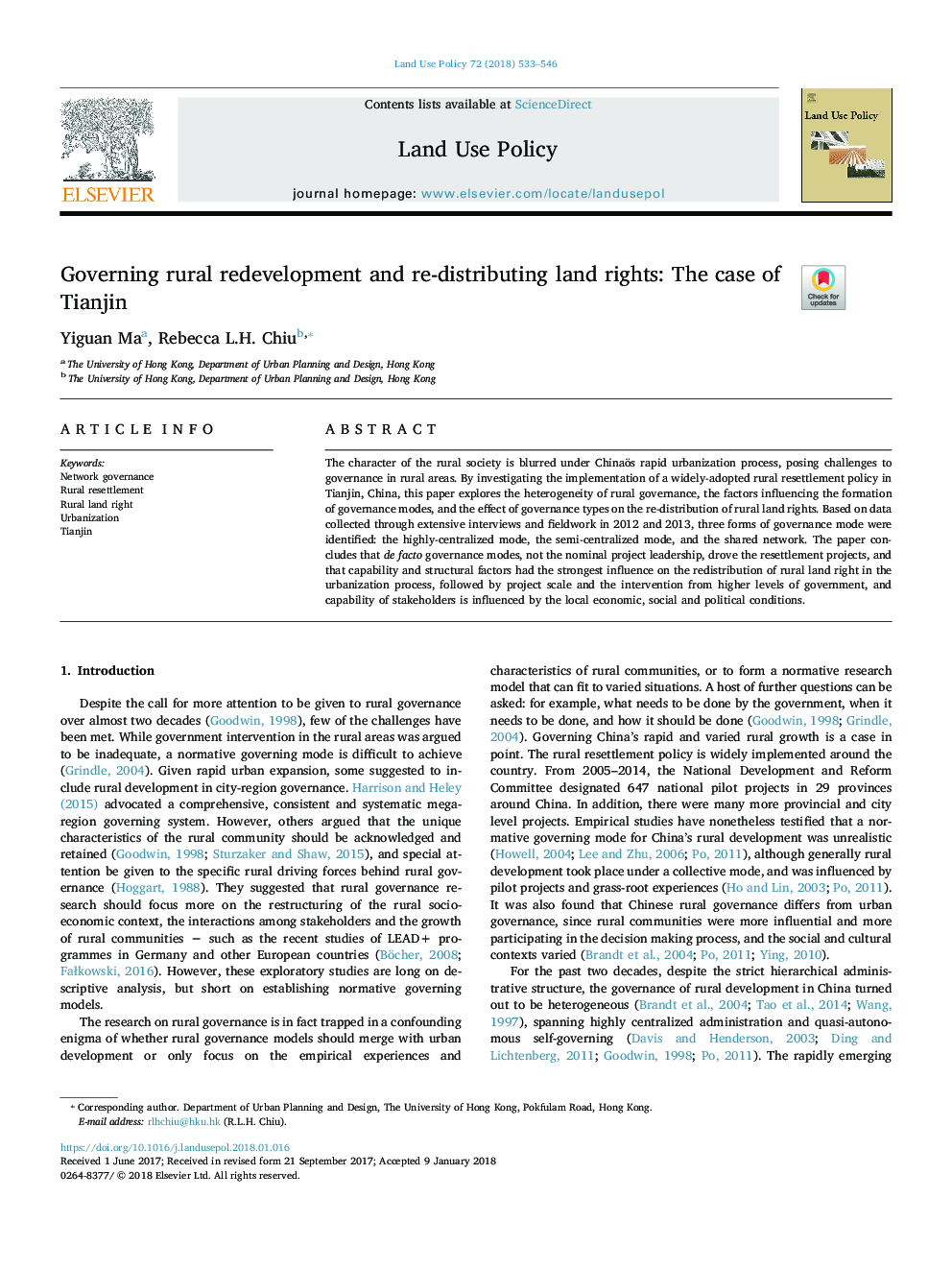| کد مقاله | کد نشریه | سال انتشار | مقاله انگلیسی | نسخه تمام متن |
|---|---|---|---|---|
| 6546704 | 1421811 | 2018 | 14 صفحه PDF | دانلود رایگان |
عنوان انگلیسی مقاله ISI
Governing rural redevelopment and re-distributing land rights: The case of Tianjin
ترجمه فارسی عنوان
اداره توسعه مجدد روستا و توزیع مجدد حقوق زمین: پرونده تیانجین
دانلود مقاله + سفارش ترجمه
دانلود مقاله ISI انگلیسی
رایگان برای ایرانیان
کلمات کلیدی
حکومتداری شبکه، اسکان مجدد روستایی، زمین روستایی راست، شهرنشینی، تیانجین،
ترجمه چکیده
شخصیت جامعه روستایی تحت فرآیند چین در چارچوب تحولات در حال توسعه سریع است و چالش هایی را برای حکومتداری در مناطق روستایی ایجاد می کند. با بررسی پیاده سازی یک سیاست اسکان مجدد روستایی به طور گسترده در تایوان، چین، این مقاله به بررسی ناهمگونی حکومتداری روستایی، عوامل موثر بر شکل گیری شیوه های حکمرانی و تأثیر انواع حکومت بر توزیع مجدد حقوق زمین های روستایی . بر اساس اطلاعات جمع آوری شده از مصاحبه های گسترده و انجام کارهای میدانی در سال های 2012 و 2013، سه شکل از حالت حکومتی مشخص شد: حالت بسیار متمرکز، حالت نیمه متمرکز و شبکه مشترک. این مقاله نتیجه می گیرد که شیوه های حکومت دینی، نه رهبری اسمی پروژه ها، پروژه های اسکان مجدد را به اجرا در آوردند و این توانایی ها و عوامل ساختاری بیشترین تاثیر را در توزیع مجدد حق روستایی روستا در روند شهرسازی داشتند و به دنبال آن مقیاس پروژه و مداخله از سطح بالاتری از دولت و توانایی ذینفعان تحت تاثیر شرایط اقتصادی، اجتماعی و سیاسی محلی قرار دارد.
موضوعات مرتبط
علوم زیستی و بیوفناوری
علوم کشاورزی و بیولوژیک
جنگلداری
چکیده انگلیسی
The character of the rural society is blurred under Chinaös rapid urbanization process, posing challenges to governance in rural areas. By investigating the implementation of a widely-adopted rural resettlement policy in Tianjin, China, this paper explores the heterogeneity of rural governance, the factors influencing the formation of governance modes, and the effect of governance types on the re-distribution of rural land rights. Based on data collected through extensive interviews and fieldwork in 2012 and 2013, three forms of governance mode were identified: the highly-centralized mode, the semi-centralized mode, and the shared network. The paper concludes that de facto governance modes, not the nominal project leadership, drove the resettlement projects, and that capability and structural factors had the strongest influence on the redistribution of rural land right in the urbanization process, followed by project scale and the intervention from higher levels of government, and capability of stakeholders is influenced by the local economic, social and political conditions.
ناشر
Database: Elsevier - ScienceDirect (ساینس دایرکت)
Journal: Land Use Policy - Volume 72, March 2018, Pages 533-546
Journal: Land Use Policy - Volume 72, March 2018, Pages 533-546
نویسندگان
Yiguan Ma, Rebecca L.H. Chiu,
